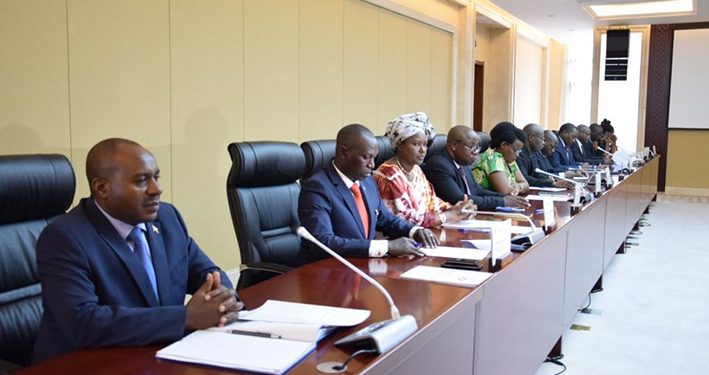Burundi held an extraordinary cabinet meeting Thursday to discuss a way forward after the tragic passing of outgoing President Pierre Nkurunziza who was due to step down on August 20.
Nkurunziza, 55, would hand over power to Gen. Evariste Ndayishimiye, the country’s elected legitimate leader, also a close associate of the deceased.
Ndayishimiye was selected by the ruling party- CNDD-FDD as the flagbearer following Nkurunziza’s proclamation that he would be stepping down from Presidency after serving 15 years in leadership.
Burundi, on May 20 voted for President and Ndayishimiye won with 68%. However, his victory was contested by Agathon Rwasa, his closest opponent in the Constitutional Court.
But Court ruled: the petition filed by Mr. Agathon Rwasa and CNL party was admissible, but partly unfounded.
Court further said the allegations raised by Rwasa couldn’t influence the results of the election even if they were founded.
Therefore, Gen. Ndayishimiye was again announced by Court as Burundi’s duly elected President waiting to receive instruments of power on August 20, in what would be a historic peaceful transition witnessed after 58 years of independence.
Looming Political Crisis?
But June 8, a tragedy befell the East Africa’s smallest nation with the sudden death of Pierre Nkurunziza, a renowned sportsman jogging to assume the position of “supreme guide to patriotism” with $540,000 retirement package and a luxury palace.
Official government channels relate his death to cardiac arrest while a section of experts pronounced otherwise.
The big concern which catapulted after the death of Nkurunziza is ‘who in charge of country?’ leaving anxiety over the future of Burundi.
Article 121 of the Burundi’s Constitution says in case of a vacancy because of demission, death or any other causes of a definitive end to his functions, the interim will be assured by the President of the National Assembly (Speaker) or, if he is also impeded from exercising his functions, by the Vice-Presidents of the Republic and the Government acting collectively.
Contention
In a rare turn of events, Burundi had already elected a President ready to be sworn in.
This, therefore prompted cabinet to convene an extraordinary meeting on Thursday in Bujumbura chaired by the First Vice President Gaston Sindimwo to study how to swear in Gen. Ndayishimiye.
This website has obtained a cabinet paper which was subjected to discussion for close to 4 hours until a consensus was reached to refer the matter to the Constitutional Court for pronouncement.
Charles Ndagijimana, the president of the Constitutional Court is expected to issue his ruling over the matter as soon as possible, a high ranking official told us on Thursday evening.
Cabinet Proposal
Below is what the panel of Ministers discussed in Bujumbura.
PROPOSALS FOR READING THE PRESENT SITUATION (Article 121 of the two Constitutions of 2005 and 2018: vacancy or not of the Presidency of the Republic and Constitutional ways for the exit of this situation).
POSITION OF THE PROBLEM: (Article 121 high city: vacancy of the Presidency of the Republic).
The problem is to know if, at the moment, the Presidency of the Republic is vacant or not. Thus, there would be an appropriate suite for the exercise of Executive Power, in accordance with the constitutional provisions.
Currently, the procedure to be followed is also provided for by article 121 of the two Constitutions of 2005 and 2018.
Indeed, the vacancy is noted by the Constitutional Court seized (2005: collegially by the two Vice-Presidents of the Republic and the Government ) or (2018: collegially by the Vice President of the Republic and the Government).
Then the interim authority takes office. However, according to this same article 121 in fine, the mission of this interim authority is to “organize the presidential ballot”, the latter “must take place within a period not less than one month and not more than two months”.
The said 2020 presidential election has already taken place. Consequently, in the absence of a mission to be assigned to the new interim authority as provided for by the Constitution, the Constitutional Court would be collegially seized by the two Vice-Presidents of the Republic and the Government (Constitution of 2005), not for the purpose of note the vacancy, but rather to interpret this situation in order to decide on the vacancy or not of the Presidency of the Republic.
And, failing a mission to assign to this interim authority, the August Court would have to rule on this; and the new President elected in 2020 would be sworn in.
In any event, for the general interest, consultation (by politicians at the top) is necessary in order to have the same reading of this state of affairs and of the decision that would be rendered by this Court.





